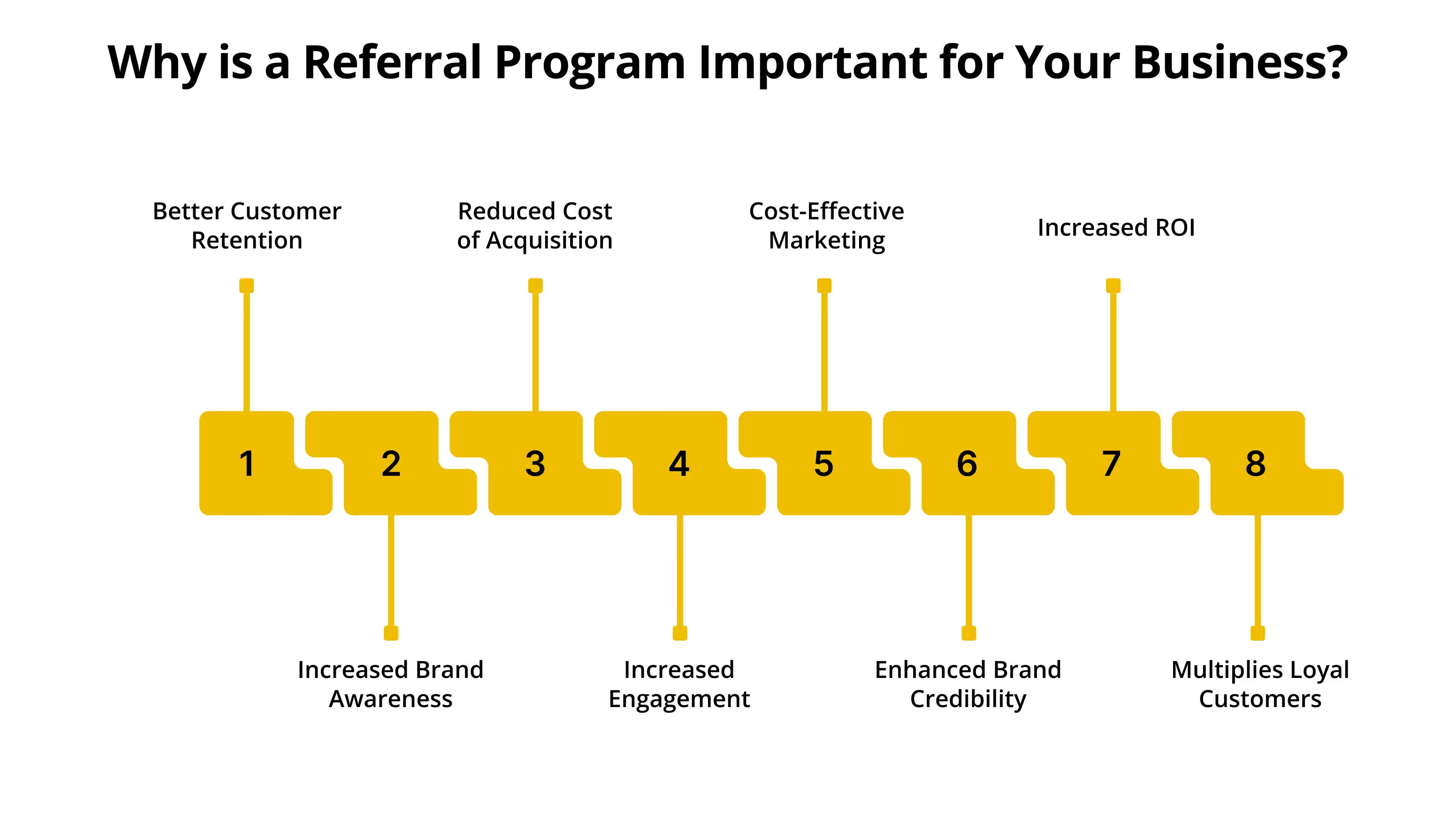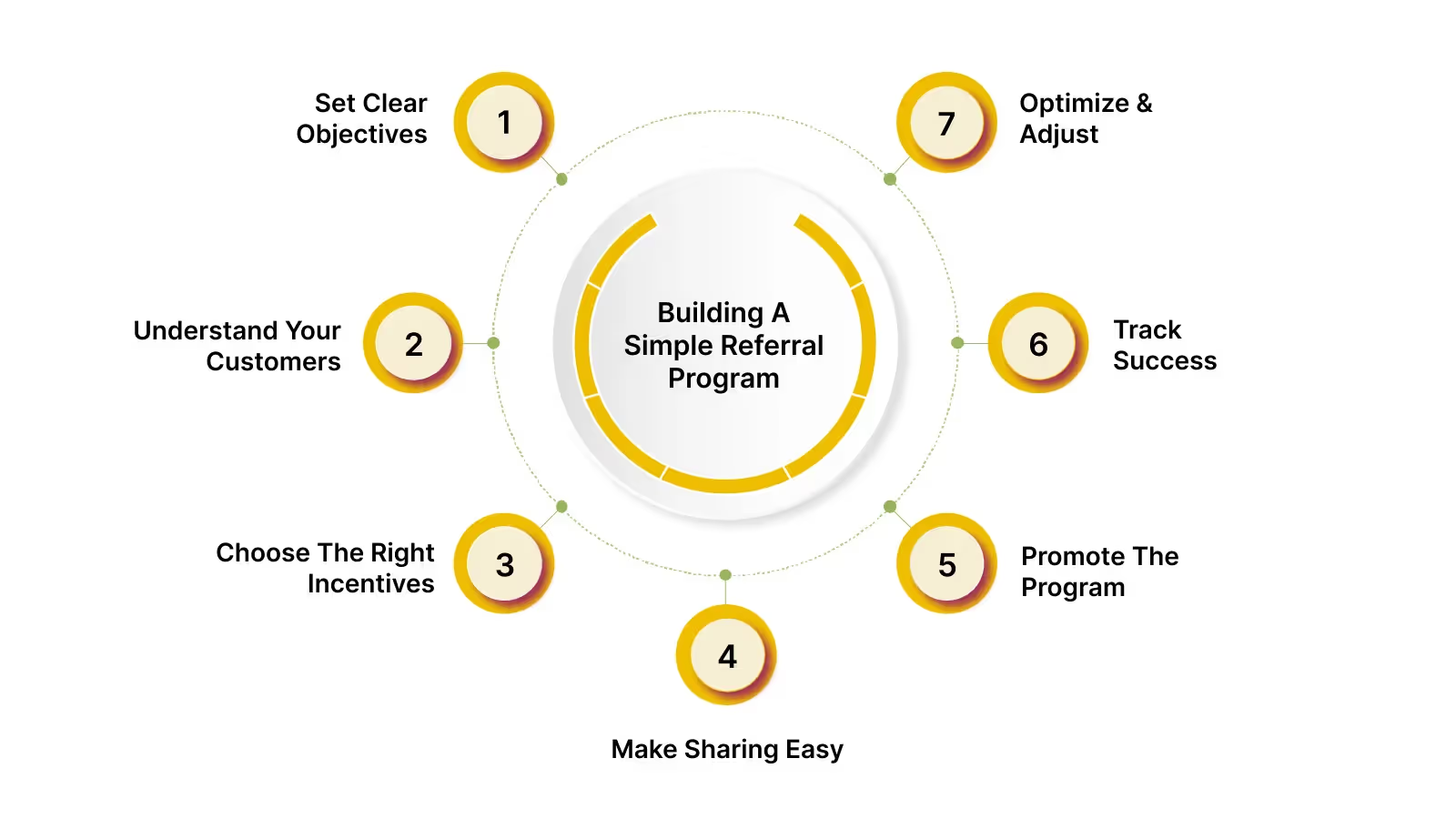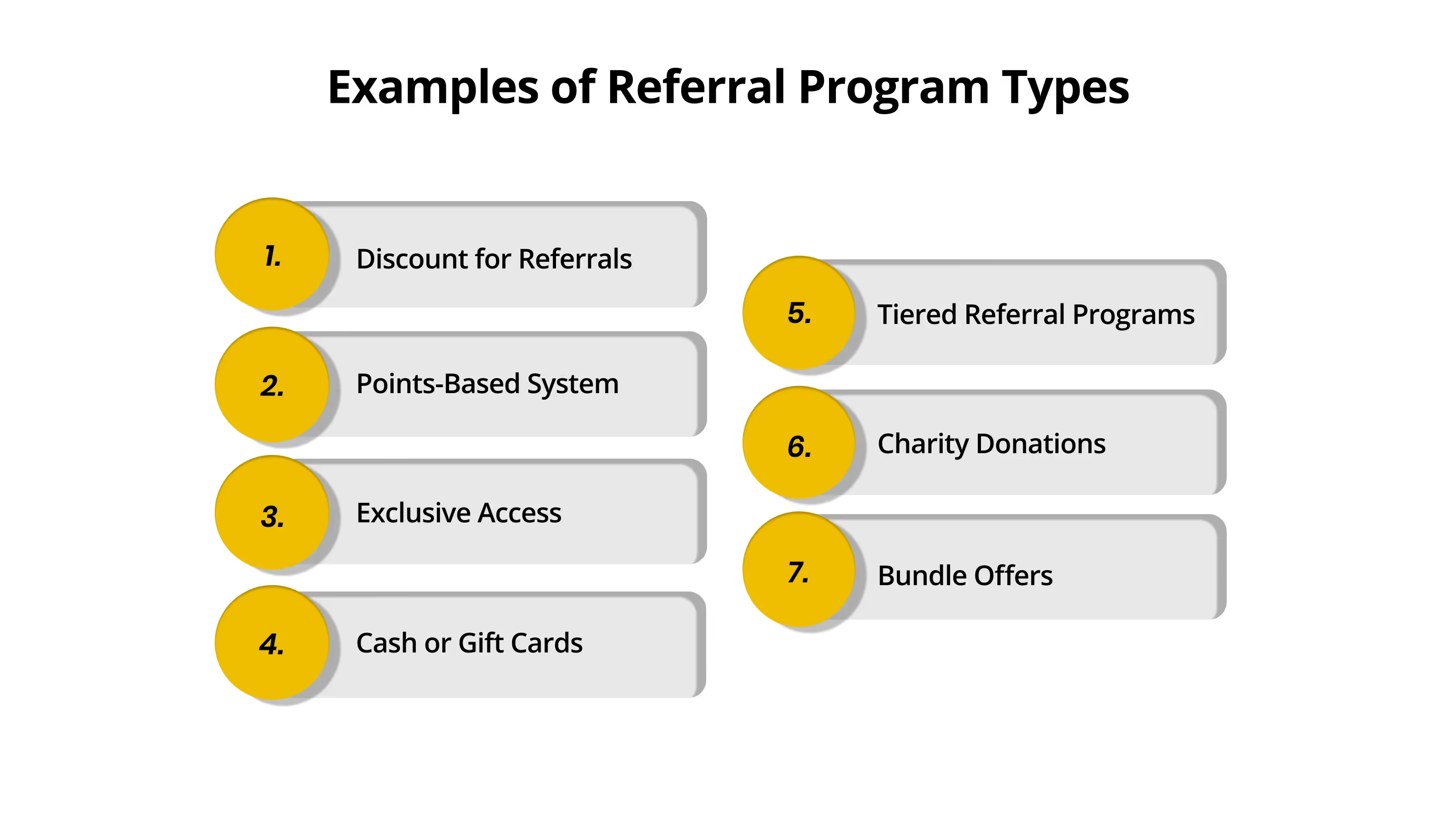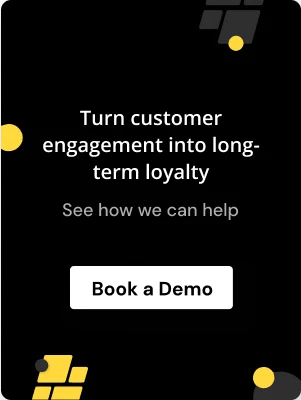.avif)
.avif)
Have you ever recommended a product or service to a friend, just because it worked so well for you? What if you could get rewarded for doing so? Referral programs offer businesses an excellent opportunity to turn satisfied customers into powerful brand advocates. In fact, studies show that referred customers have a 37% higher retention rate compared to those acquired through other channels. But building a referral program that works isn't as complicated as you might think.
In this blog, we’ll walk you through the steps to set up a simple and effective referral program in 2025. From setting clear goals to tracking results, we’ll cover everything you need to know to make sure your referral program helps grow your business and build customer loyalty.
Key Takeaways
- Referral Program Basics: A referral program incentivizes current customers to refer new ones in return for rewards, helping to expand your customer base and boost brand loyalty.
- Steps to Build a Program: Define clear objectives, understand your customer base, choose the right incentives, make sharing easy, and promote the program across multiple channels.
- Types of Referral Programs: Popular options include discounts for referrals, points-based systems, exclusive access for top referrers, and tiered rewards.
- Track Success and Adjust: Regularly measure key metrics like referral conversion rates and adjust incentives or processes to optimize program performance.
Understanding the Referral Programs
A referral program is a marketing strategy where you give rewards to your existing customers to refer to new ones. It’s all about turning your satisfied customers into advocates by rewarding them for introducing friends, family, or colleagues to your brand. When designed properly, referral programs create a win-win situation where both the referrer and the referred customer benefit, creating a more loyal and engaged customer base. Platforms like Nector simplify this process by providing you with the tools you need to automate referral tracking, customize incentives, and optimize your program to get the best results.
Why is a Referral Program Important for Your Business?

Referral programs offer multiple benefits that can help your business grow effectively and efficiently. Here’s why you should consider integrating one into your business strategy:
- Better Customer Retention: When customers refer to your brand, they’re often more loyal and are actively engaged. This fosters long-term relationships.
- Increased Brand Awareness: Your customers’ word-of-mouth recommendations help spread the word and attract new people to your brand.
- Reduced Cost of Acquisition: Acquiring customers through referrals costs far less than traditional marketing methods, making it a budget-friendly option.
- Increased Engagement: Referral programs keep customers involved, encouraging them to actively promote your brand and, in turn, boosting engagement.
- Cost-Effective Marketing: Referral programs are highly cost-effective because they rely on existing customers to bring in new ones, cutting down on marketing expenses.
- Enhanced Brand Credibility: People trust the recommendations of their peers more than advertisements. Referrals add credibility to your brand.
- Increased ROI: Referral programs generate better returns as they target existing, loyal customers who already trust your brand.
- Multiplies Loyal Customers: The more referrals you get, the more loyal customers you create, and the cycle continues.
A well-structured referral program can significantly increase customer retention and brand awareness, and lower your acquisition costs, making it a win-win for your business.
A leading baby care brand achieved a 45% referral completion rate using Nector’s loyalty and rewards strategy. Learn more about how Nector can transform your referral program by reading this case study.

Building a Simple Referral Program

Building a referral program that works doesn’t have to be difficult. By following these key steps, you can set up a system that motivates your customers to spread the word about your brand.
1. Set Clear Objectives
Before you start, decide what you want to achieve with your referral program. Setting clear goals helps guide your decisions and measure success, whether you’re aiming to increase sales, expand your customer base, or boost brand awareness.
2. Understand Your Customer Base
To create an effective referral program, it’s important to understand what motivates your customers. Do they prefer discounts? Free products? Or are they more interested in exclusive access to events or offers? Knowing what your customers value the most will help you design a program that appeals to them.
3. Choose the Right Incentives
A good incentive is key to a successful referral program. Consider rewards that make sense for your audience, whether it's a discount, store credit, or a free product. Offering incentives to both the referrer and the referee to create a win-win situation.
4. Make It Easy to Share
The easier it is for your customers to refer others, the more likely they will. Provide them with shareable links, social media integration, or unique referral codes they can send directly to their friends and family. Keep the process simple and hassle-free.
5. Promote Your Referral Program
Once your program is ready, you need to let your customers know about it. Promote it through your website, social media, email newsletters, and in-store (if applicable). The more visibility your program gets, the more successful it will be.
6. Track and Measure Success
Use analytics to measure the effectiveness of your program. Track how many referrals are made, the conversion rates, and the impact on sales. Regularly review these metrics and adjust the program as needed to improve its performance.
7. Optimize and Adjust
Over time, you'll gather valuable feedback and data on what works and what doesn't. Make tweaks as needed to ensure your program stays relevant and appealing. For example, if a certain incentive isn’t resonating with customers, consider changing it to something more appealing.
With these steps, you can create a referral program that’s easy to manage, drives customer engagement, and ultimately helps your business grow.
Did you Know?
E-commerce businesses experience a 68% higher conversion rate from traffic generated through referrals.

Common Mistakes to Avoid When Building a Referral Program
.avif)
Even with a strong referral program, businesses can run into some issues. Here are a few common mistakes to avoid:
- Complicated Referral Process: If the process is too confusing or takes too long, customers won’t bother referring. Keep it simple!
- Unappealing Rewards: If your incentives don’t resonate with your customers, they won’t feel motivated to refer others.
- Not Promoting Enough: Even if you’ve set up a great program, if your customers don’t know about it, it won’t succeed. Consistently promote it!
- Lack of Tracking and Analytics: Without tracking, you won’t know what’s working and what’s not. Regularly track and measure performance to make necessary adjustments.
Avoiding these common pitfalls will help you set up a referral program that’s not only effective but also simple and enjoyable for your customers to participate in.
Also Read: H&M's Customer Loyalty Program: A Comprehensive Analysis of Their Rewarding Strategy
Examples of Referral Program Types

There are many ways to structure a referral program depending on your business model and goals. Here are a few types to consider:
1. Discount for Referrals
This is one of the most straightforward and popular referral models. You offer both the referrer and the referee a discount on their next purchase. It’s a win-win situation, encouraging new customers to try your products and keeping your current customers engaged and rewarded for their effort.
2. Points-Based System
Instead of giving a discount, you can offer customers loyalty points for every successful referral. These points can be redeemed for future purchases, making it a great way to build long-term customer loyalty. Customers are motivated to keep referring to accumulate more points for bigger rewards.
3. Exclusive Access
Reward your most loyal and active referrers with exclusive access to new products, special sales, or private events. This type of referral program makes customers feel appreciated and valued, while also offering them a unique experience that others don’t have.
4. Cash or Gift Cards
Offering cash rewards or gift cards for successful referrals is a direct way to encourage your customers to participate. By offering a tangible reward, you motivate customers to put in the effort to spread the word.
5. Tiered Referral Programs
In this model, customers can earn different rewards depending on how many people they refer. For example, they might earn small rewards for their first few referrals and larger, more exclusive rewards once they reach a higher number. This system motivates customers to continue referring to unlock better rewards.
6. Charity Donations
Some customers may appreciate the option to donate their referral rewards to charity. By allowing customers to choose where their rewards go, you create an emotional connection and reinforce brand values, appealing to customers who value giving back.
7. Bundle Offers
For every successful referral, you can offer both the referrer and the referee a product bundle at a discounted rate. This type of offer not only encourages referrals but also increases the perceived value of the reward, prompting more customers to participate.
Choosing the right type of referral program depends on what motivates your customers the most, and it’s essential to tailor the rewards to their preferences. By structuring your referral program effectively, you can create a system that drives growth, increases engagement, and builds brand loyalty.
Also read: 15 Best Customer Referral Program Ideas for 2025
How Nector Can Help with Your Referral Program
Building a successful referral program is easier than you think, especially with the right tools. Nector’s Referral Program offers a variety of features that streamline the entire process and drive better results.
- Lower CAC: Acquire new customers at a fraction of your usual ad spend through referrals.
- Dual-Sided Rewards: Reward both referrers and referees with coupons, coins, or discounts.
- Built-in Fraud Protection: Eliminate fake referrals and ensure authentic customer conversions.
- Easy Integration & Tracking: Plug into your store and track referral performance effortlessly.
With Nector’s user-friendly platform, you can manage your referral program more efficiently, saving time and ensuring your program is successful.
Final Thoughts
Building a referral program in 2025 is a great way to grow your customer base and increase customer loyalty. By following the steps outlined in this blog, you can set up a referral program that motivates customers to spread the word about your brand. If you’re looking for a platform to help automate and optimize your referral efforts, Nector offers the tools you need to make your program a success.
Ready to start building your referral program? Book a demo with Nector today and discover how our platform can help you maximize your referral program and grow your business!
Frequently Asked Questions (FAQs)
1. What is a referral program?
A well-structured referral program encourages current customers to introduce your brand to new ones, with rewards for both parties.
2. What are the best rewards for a referral program?
Rewards can include discounts, store credit, free products, or exclusive access to sales or events.
3. How do I promote my referral program?
You can promote your referral program through email newsletters, social media, on your website, and by including referral links in your post-purchase communication.
4. How do I track the success of my referral program?
Use analytics tools to measure how many people are referred, how many convert to paying customers, and the total value generated by the program.
5. Can Nector help me with my referral program?
Yes! Nector offers a CRM platform that automates referral tracking, allows for customizable incentives, and provides detailed analytics to help you manage your referral program effectively.
FAQs
Start Building Customer Retention That Lasts


.avif)


%201.webp)



